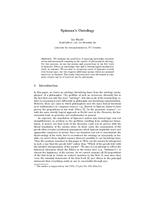LATPub288: Unterschied zwischen den Versionen
Aus International Center for Computational Logic
Marcel Lippmann (Diskussion | Beiträge) KKeine Bearbeitungszusammenfassung |
Marcel Lippmann (Diskussion | Beiträge) KKeine Bearbeitungszusammenfassung |
||
| Zeile 10: | Zeile 10: | ||
|Month= | |Month= | ||
|Booktitle=Proceedings of the 1st Workshop on Philosophy and Informatics (WSPI 2004) | |Booktitle=Proceedings of the 1st Workshop on Philosophy and Informatics (WSPI 2004) | ||
|Editor=G. | |Editor=G. Büchel and B. Klein and T. Roth-Berghofer | ||
|Note= | |Note= | ||
|Organization=DFKI | |Organization=DFKI | ||
Version vom 20. März 2015, 16:28 Uhr
Spinoza's Ontology
J. HladikJ. Hladik
J. Hladik
Spinoza's Ontology
In G. Büchel and B. Klein and T. Roth-Berghofer, eds., Proceedings of the 1st Workshop on Philosophy and Informatics (WSPI 2004), DFKI Research Reports, 2004. DFKI
Spinoza's Ontology
In G. Büchel and B. Klein and T. Roth-Berghofer, eds., Proceedings of the 1st Workshop on Philosophy and Informatics (WSPI 2004), DFKI Research Reports, 2004. DFKI
- KurzfassungAbstract
We examine the possibility of applying knowledge representation andautomated reasoning in the context of philosophical ontology. For this purpose, we use the axioms and propositions in the first book of Spinoza's Ethics as knowledge base and a tableau-based satisfiability tester as reasoner. We are able to reconstruct most of Spinoza's system with formal logic, but this requires additional axioms which are assumed implicitly by Spinoza. This study illustrates how tools developed in computer science can
be of practical use for philosophy. - Forschungsgruppe:Research Group: AutomatentheorieAutomata Theory
@inproceedings{ Hladik-WSPI-04,
author = {J. {Hladik}},
booktitle = {Proceedings of the 1st Workshop on Philosophy and Informatics (WSPI 2004)},
editor = {G. {B\"uchel} and B. {Klein} and T. {Roth-Berghofer}},
number = {RR-04-02},
series = {DFKI Research Reports},
title = {Spinoza's Ontology},
year = {2004},
}
